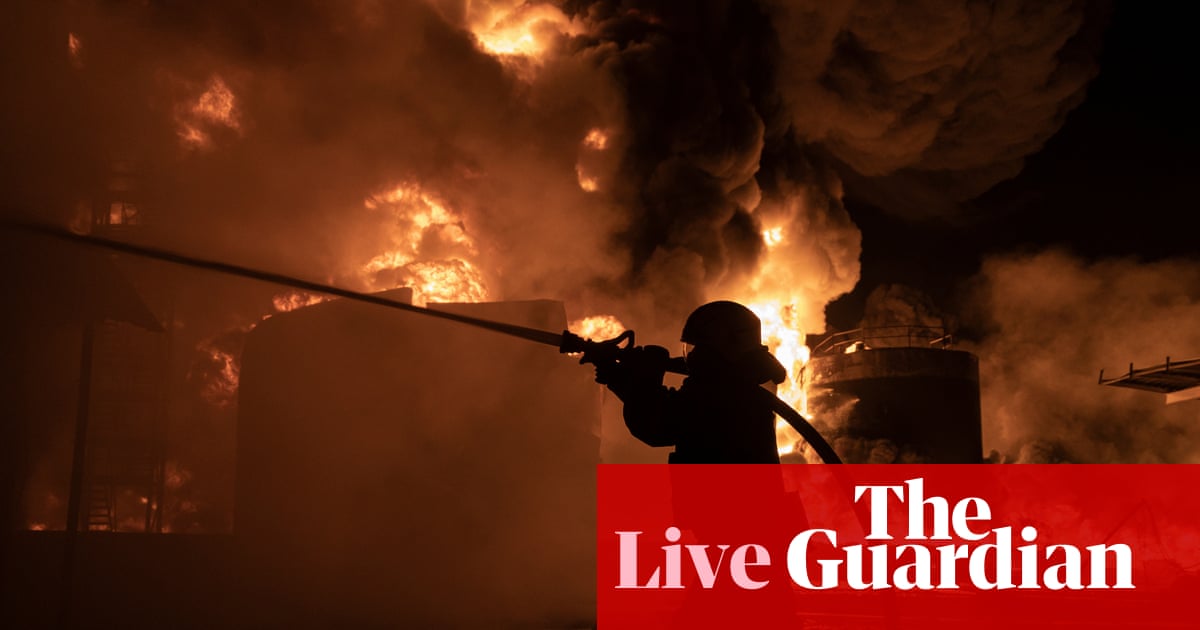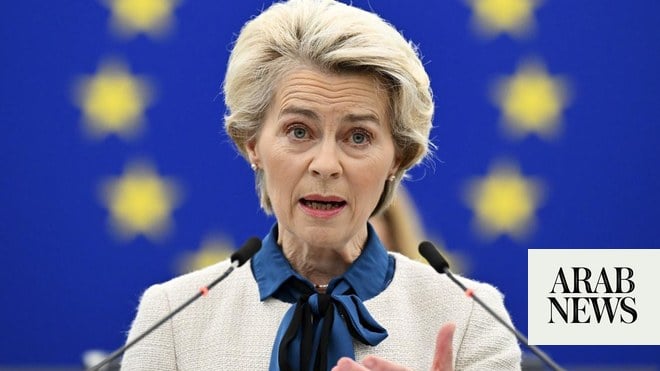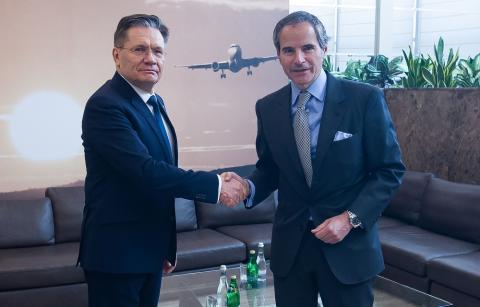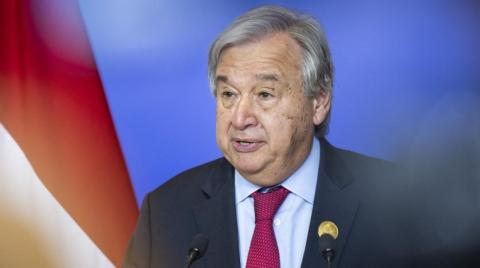
Russia cut off natural gas to NATO members Poland and Bulgaria and threatened to do the same to other countries
Guterres repeated calls for both Russia and Ukraine to work together to set up "safe and effective" humanitarian corridors in war-torn Ukraine
LONDON: The European Union warned Russia on Wednesday it would not bend to “blackmail” over its support for Kyiv, after the Kremlin cut off gas supplies to Bulgaria and Poland.
Russia cut off natural gas to NATO members Poland and Bulgaria on Wednesday and threatened to do the same to other countries, using its most essential export in what was seen as a bid to punish and divide the West over its support for Ukraine.
The move, condemned by European leaders as “blackmail,” marked a dramatic escalation in the economic war of sanctions and counter sanctions that has unfolded in parallel to the fighting on the battlefield.
The EU warning came as UN chief Antonio Guterres arrived in Kyiv to meet Ukrainian leader Volodymyr Zelensky following talks with Russian President Vladimir Putin in Moscow to expand humanitarian support and secure civilian evacuations.
“I have arrived in Ukraine after visiting Moscow,” he wrote on his official Twitter account as he landed ahead of talks with Ukraine’s President Volodymyr Zelensky.
“We will continue our work to expand humanitarian support and secure the evacuation of civilians from conflict zones. The sooner this war ends, the better — for the sake of Ukraine, Russia, and the world,” Guterres tweeted.
At the Moscow talks on Tuesday, Guterres repeated calls for both Russia and Ukraine to work together to set up “safe and effective” humanitarian corridors in war-torn Ukraine.
In turn, Putin told him he hoped that negotiations could end the conflict which saw Russian troops invading Ukraine on February 24.
“Despite the fact that the military operation is ongoing, we still hope that we will be able to reach agreements on the diplomatic track,” the Russian leader said in televised remarks.
However, Putin also issued his own warning on Wednesday, saying that if Western forces intervene in Ukraine, they will face a “lightning-fast” military response.
“We have all the tools for this, that no one else can boast of having,” the Russian leader told lawmakers, implicitly referring to Moscow’s ballistic missiles and nuclear arsenal.
“We won’t boast about it: we’ll use them, if needed. And I want everyone to know that,” he said. “We have already taken all the decisions on this.”
The dire threats came as Moscow claimed to have carried out a missile strike in southern Ukraine to destroy a “large batch” of Western-supplied weapons.
As the war, which has already claimed thousands of lives, entered its third month, Kyiv conceded that Russian forces had made gains in the east.
Russia’s military offensive saw it capture a string of villages in the Donbas region, now the immediate target of its invasion force.
And in its economic standoff with the West, Moscow cut off gas supplies to Bulgaria and Poland, two EU and NATO members backing Ukraine in the conflict.
However later Wednesday In Brussels, Ursula von der Leyen, the president of the European Commission, said Poland and Bulgaria are now receiving gas from their EU neighbors.
She described the announcement by Russia’s state energy giant Gazprom as “another provocation from the Kremlin” that would be countered.
“It comes as no surprise that the Kremlin uses fossil fuels to try to blackmail us,” she said. “Today, the Kremlin failed once again in his attempt to sow division among member states. The era of Russian fossil fuel in Europe is coming to an end.”
“Both Poland and Bulgaria are now receiving gas from their EU neighbors,” she said. “The era of Russian fossil fuels in Europe will come to an end.”
EU officials said energy ministers from across the bloc will meet on Monday to discuss the situation.
European powers have imposed massive sanctions on Russia since Putin’s decision to invade his neighbor, while shipping weapons to Ukraine’s defenders.
But they have moved slowly on hitting Moscow’s vast gas exports, with many EU members — notably industrial giant Germany — reliant on Russian energy to keep their lights on.
Putin has attempted to turn up the pressure by insisting that Russia will only accept payments for gas in rubles — hoping to force his foes to prop up his currency.
Gazprom announced the halt of gas to both Poland and highly dependent Bulgaria, saying it had not received payment in rubles from the two EU members.
But von der Leyen said that “about 97 percent” of all EU contracts explicitly stipulate payments in euros or dollars — and warned importing firms off paying in rubles.
“This would be a breach of the sanctions,” she told reporters.
The European Commission on Wednesday sought to lend Kyiv economic support by proposing a suspension of import duties on Ukrainian goods, but the idea still needs to be approved in a vote by the bloc’s 27 members.
The first phase of Russia’s invasion failed to reach Kyiv and to overthrow President Zelensky’s government after encountering stiff Ukrainian resistance reinforced with Western weapons.
The campaign has refocused on seizing the east and south of the country, while increased the use of long-range missile strikes against west and central Ukraine to counter the Western response.
Ukraine’s Defense Minister Oleksiy Reznikov predicted “extremely difficult weeks” for the country amid “destruction and painful casualties” during the offensive.
Russia’s defense ministry said its forces had destroyed a “large batch” of weapons and ammunition supplied by the United States and European countries.
Russia hit hangars at an aluminum plant near the Ukrainian city of Zaporizhzhia with “high-precision long-range sea-based Kalibr missiles,” the ministry said.
It also accused Ukraine of preparing to stage a fake civilian massacre in Lysychansk by disguising the bodies of dead Ukrainian soldiers in civilian clothing and taking them to the city’s central market.
On Tuesday, at a summit in Germany of 40 Western allies to discuss arming Ukraine, Washington pledged to move “heaven and earth” to enable Kyiv to emerge victorious from the war.
Tensions are also rising in a breakaway region of Moldova bordering southwestern Ukraine.
In the region, Transnistria, pro-Russian separatists claimed shots were fired across the border toward a village housing a Russian arms depot, after drones flew over from Ukraine.
Britain was set Wednesday to urge Kyiv’s allies to “ramp up” military production including tanks and planes to help Ukraine, with Foreign Secretary Liz Truss set to call for a “new approach” to confront Putin.
Fighting continues to rage across Ukraine’s east, Kyiv’s defense ministry said, as it confirmed Russian forces had seized several villages in their renewed bid to “liberate” the Donbas region.
The ministry said a pair of villages in the north-eastern Kharkiv region and two in the Donetsk region had fallen.
Meanwhile, three people died and 15 others were injured in bombings around the eastern city of Kharkiv, Ukraine’s second city, regional governor Oleg Synegubov said.
Moscow aims to create a land bridge between territory held by pro-Russian separatists in parts of the Donbas and the Russian-annexed Black Sea peninsula of Crimea.
Separately, Moscow also said it was expelling eight Japanese diplomats in a tit-for-tat response to expulsions by Tokyo over the conflict in Ukraine.
The UN tourism body added to Russia’s isolation on the international scene as most of its 159 members on Wednesday voted to suspend it from the agency.
(With AFP and AP)












